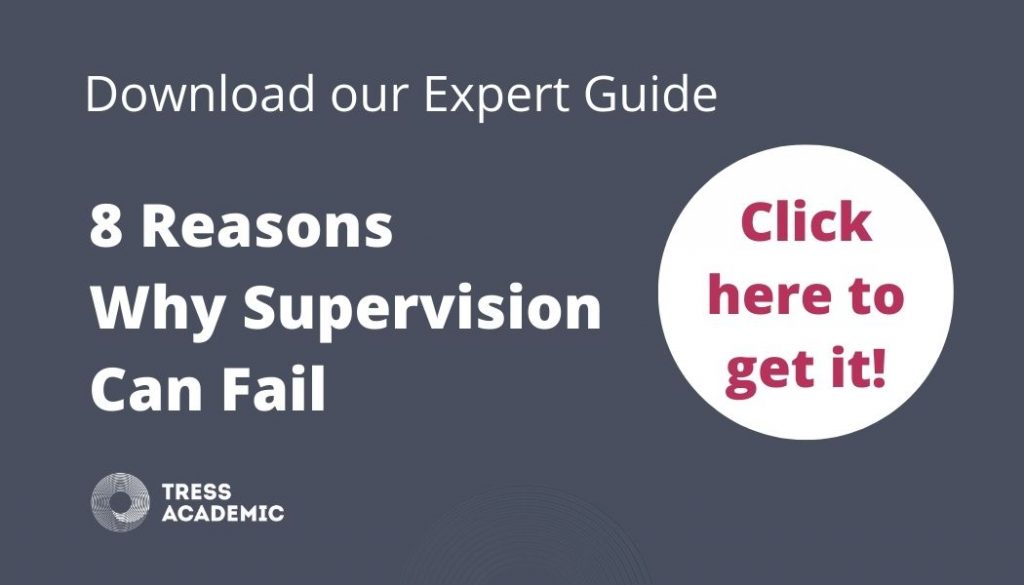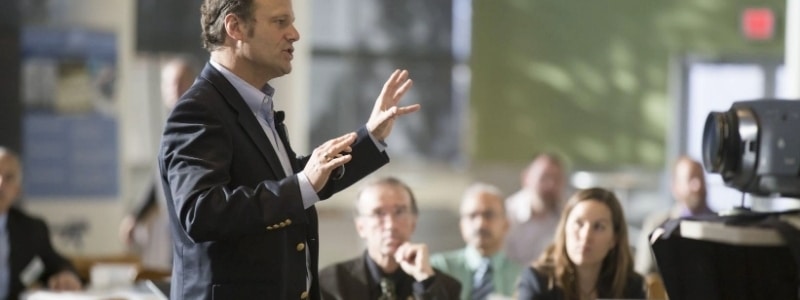- Skip to primary navigation
- Skip to main content
- Skip to footer
Tress Academic


#10: Good PhD-supervision: What you can expect
May 14, 2019 by Tress Academic
Are you wondering what one might typically be able to expect from a good PhD supervisor? Are you uncertain if your own supervision ticks all the boxes? Are you having one issue or another with supervision and you’re not sure if this is normal? We’ve compiled this exposé of ‘Five pillars of good PhD-supervision’ to give you more clarity on what to expect, plus an added bonus self-check ‘How good is my PhD supervision?’
We often find that PhD students are uncertain as to what they might actually be able to expect from a PhD supervisor, and what actions a good supervisor would or wouldn’t take. We also often meet PhD students who are having issues with supervision, but do not know if what they’re experiencing is common, normal or actually an exception.
There is evidence from a range of studies of how important good supervision is for the PhD experience, process and outcome ( Woolston, C. 2017 , Max Planck PhD-net 2018 ). It is quite clear, that the difficulties in undertaking a PhD study become easier with a great supervisor by your side. That is not to say that individual PhD students- who do not have good supervision won’t make it, but there is a significant difference between just ‘completing ’ or handing in a great dissertation with a fantastic learning experience behind them. Everyone can benefit from the expertise of a superb and experienced supervisor.
The aim of this blog-post is to give you an idea about these five essential elements, which together constitute the pillars of good PhD-supervision. This can help you to make an informed judgement about your personal situation and eventually encourage you to start improving aspects of your supervision, if you feel it necessary. For those of you who are right at the beginning of a PhD and have not yet chosen a supervisor (or not appointed all your supervisors), our five features can give you some orientation of whom to pick. Ideally, you get a trusted supervisor who will meet all five features. If you’re curious how yours stack up, we’ve included a self-check ‘How good is my PhD-supervision?’ for you to take at the end of this post!
However, there is no black and white standard of exactly what your supervisor should do, so it can be difficult to evaluate based on a formula of “if this does not happen, then they’re not a good supervisor”. The boundaries are rather grey and a good relationship to your supervisor does not hinge upon the fulfilment of a single aspect. There are many ways for good supervision to express itself.
Still, we believe there are a couple of features that are essential and constitute “good supervision” and we want to outline these for you. If your supervisor lacks several of these essential features, it can be tricky to get sufficient support for your PhD in the long run.
Today in many countries and disciplines, it is common to have a supervisory team, so you are advised by multiple people. The responsibilities are often shared between one main supervisor and 1-3 (and eventually more) co-supervisors. Supervisors may also be called mentors or advisors(just so you know that this is the same thing unless your PhD regulations specify another meaning in your case).
So here are our five pillars of good PhD supervision:
1. Guidance
Guidance is the no.1 pillar of good supervision. You should receive guidance from your supervisor for all matters – big and small – regarding your PhD study. Your supervisor should give guidance in particular, regarding:
- Your research and individual aspects hereof. What do you research and how?
- The planning of your project. That means guidance on how to design, set-up and carry out a project in the given time span.
- The outcomes of your PhD in terms of publications, patents or potential applications.
- The educational part of your studies. How you acquire the necessary skills to succeed with your project, and in a broader sense, how to become an independent researcher. This also includes complementary skills courses like the ones from TRESS ACADEMIC .
- The administrative aspects around your PhD , such as: PhD regulations of your university, deadlines and documents that have to be handed in to your graduate programme , composition of a supervisory team, examination board, submission of your dissertation, etc…
2. Expertise
Good supervision means to have a supervisor who has expertise in the very subject area in which you undertake your PhD project. So they should have excellent knowledge of the discipline, know the latest innovations and cutting-edge questions, can anticipate future trends, and are recognised scholar in your scientific community. Their research interest is your research interest and vice versa.
Ideally, your supervisor is also trained pedagogically on how to supervise PhD students. The pedagogic expertise is complementary to the research expertise. You won’t benefit much from a superstar from your field who shows little interest in transferring their knowledge to you, or does not concern themselves with how they can help you learn.

Your supervisor should support you in pursuing your goal of getting the PhD degree. Having a supportive supervisor means you have a person you can trust and who will be on your side. Support should include mental support, but it also means having a helping hand when needed – to make contact with other scientists, get help with data permits or ethical clearances, gaining you access to data, or financial support. Having a person you know you can rely on when things get tough is a big plus.
A supportive supervisor maintains a positive attitude towards your project and displays empathy. They should display a keen interest in seeing you succeed, encourage you to broaden your horizons and try out new things. They offer sympathy when something goes wrong, show understanding for your situation, and motivate you when you’re feeling down.
While guidance emphasises the procedure of successfully steering you through the 3-4 years of a PhD, support is your safety net, when you’re off track or when there’s something to handle that exceeds your power.

4. Regular interaction
Although ‘having regular interaction with your PhD supervisor’ sounds almost too obvious, we know that many PhD students struggle with this aspect. We often hear comments like ‘my supervisor is difficult to get hold of’, ’my last meeting with my supervisor was months ago’, ‘my supervisor often cancels/postpones meetings’, ‘it takes ages for my supervisor to give me feedback on my work’ and so on.
The problem with a lack of interaction is that it is key to the other pillars. If you have little interaction, most other features become problematic as well. If you lack interaction, you also lack support and guidance. You can have the ‘internationally-acknowledge-no.1-specialist’ in your field as supervisor, but if they hardly ever meet with you, you won’t get much out of their supervision.
A good supervisor maintains interaction by way of regular supervisory meetings and spontaneous encounters. Here’s a short characteristic of both types:
4.1. Supervisory meetings
In these meetings your supervisor and you meet regularly to discuss aspects of your project and PhD progress. This is the time when you get your supervisor’s full attention. You get input, can exchange ideas, you receive constructive feedback, and – as part of the package – quite a lot of – criticism as well. Through feedback in regular meetings you learn and grow. Your supervisory meetings are scholarly disputes about your work among the expert and the novice. Supervisory meetings are also necessary to administer and manage your project – setting targets, checking progress, and making sure that whatever you have to hand in to the university or grad school gets there on time and as required.
4.2. Spontaneous encounters
You should also be able to approach your supervisor spontaneously with a question, a problem, or some great news you want to share and vice versa. Spontaneous interaction allows you to ‘be-in-touch’ and get to know each other in different ways and built a collegial relationship. It can help to clarify an urgent question so that you can proceed with your work without having to wait until the next meeting.

But ad-hoc encounters are never a substitute for the regular meetings. If you have no meetings, and you receive all your supervision in form of spontaneous chats or advice, there’s something wrong.
5. Advice on progress
You’ve got a limited time to complete your PhD of 3-4 years normally. Your supervisor should be keen to see you finish in this time-frame. A good supervisor is aware of your time-constraints right from the start, and supports you in getting through the entire process in a timely manner. But, apart from guidance and support, advice on your progress needs specific actions from your supervisor. It is conscious and deliberate checking of the adequateness of your progress in the different phases of your PhD that will make the difference.
At the beginning of your PhD project, you should get advice on the adequateness of the project itself. Your supervisor should be checking if the project you want to work on is suitable for completion, with the expected outcome, in the given time-frame. A good supervisor will also warn you if that is not the case, and suggest changes to your project.
After the onset of your PhD project and further into the process, you’ll need a supervisor who is regularly checking-in with you regarding the progress of your work and it’s quality. Towards this goal, many PhD programmes have included ‘TAC’ (Thesis Advisory Committee) meetings as a fixed requirement that has to be completed in order to progress with the PhD, or getting the necessary credits for the accompanying graduate programme. In case you’re not familiar with this: during the ‘TAC’ meetings, which take place 1-4 times a year (frequency depends on your programme), all of your supervisors formally meet with you. You present your recent progress and latest results to get feedback on the adequateness of your advancement. ‘TAC’ meetings may also be called ‘PAC’ (PhD advisory committee) meetings, or ‘Supervisory Committee’ meetings.
The crucial point here is that you have at least one supervisor (but ideally multiple) who give you candid feedback once in a while so you know if you are on track or not. If you have a main supervisor who regularly checks your progress, and you hold the required number of TAC-meetings, you’re minimising the chance that there will be problems with the acceptance of your PhD thesis and the potential for lengthy demands to make fundamental changes to your dissertation in the end.
In the final year and months, a good supervisor will advise you on the completion of individual parts of your work and requirements for submitting your thesis and preparations for the defence and final examination.
How good is your supervision?
Now, are you pondering how your supervision scores on the five mentioned pillars? Are you happy with your supervision? Do you get good guidance? Are you benefitting from your supervisors’ expertise? Does your supervisor meet regularly with you? Do you receive support when you’re feeling down and demotivated? And, is someone giving you frank feedback on your progress?
If you’re curious, take our self-check ‘ How good is my PhD supervision?’
So how were your results? Did you score super high and you have an amazing supervisor? Well great! You’ll get all the necessary support along the path to PhD completion.
Or are you among those with quite modest scores and feeling unhappy with your supervisory situation? Think about what you might do to improve it. Like in any other relationship you have a great deal of influence! Have you spoken to your supervisor about your requirements and made them explicit? Have you been honest about your struggles or difficulties? Your supervisor only has a chance to respond to your needs if you let them know what they are! Stay tuned to the SMART ACADEMICS blog for more supervision topics that give more detail on how to improve your relationship with your supervisor!

Related resources:
- Expert guide: 8 reasons why supervision can fail.
- Self-check: ‘How good is my PhD supervision?’
- Smart Academics Blog #12: PhD graduate school: Your game changer!
- Smart Academics Blog #57: Can’t get your message across to your supervisor?
- Smart Ac ademics Blog #68: PhD Support: Pick the perfect co-supervisor
- Smart Academics Blog #80: Do I have to include my supervisor as a co-author?
- Smart Academics Blog #81: Meet your PhD supervisor online!
- Smart Academics Blog #98: Should I replace my PhD supervisor?
- Smart Academics Blog #114: PhD-journey with obstacles and happy end!
- Woolston, C. 2017: A love-hurt relationship. Nature, vol. 550, pp. 549-552 .
- Max Planck PhD-net 2018: 2017 PhDnet report.
More information:
Do you want to complete your PhD successfully? If so, please sign up to receive our free guides.
© 2019 Tress Academic
#PhDStudent, #PhDEducation, #Supervision, #PhDSatisfaction, #Doctorate

Top tips for choosing a PhD Supervisor
Özge Özden lays out the pros and cons you need to consider when choosing a PhD supervisor, as well as five key qualities to look out for

Created in partnership with

You may also like

Popular resources

.css-1txxx8u{overflow:hidden;max-height:81px;text-indent:0px;} Emotions and learning: what role do emotions play in how and why students learn?
Artificial intelligence and academic integrity: striking a balance, should academics embrace ambidextrous leadership, we need a reset to help black academics thrive, not survive, let students know they don’t know.
Selecting a PhD supervisor is one of the most crucial – and difficult – decisions a young researcher will have to make. And while there is no failsafe method of choosing one, your decision will undoubtedly be influenced by the subject in which you intend to work, the sort of research you wish to do and your checklist of goals for your PhD.
It is unwise to dismiss the importance of any personality traits that you think may make a relationship with a supervisor difficult. Remember that, when doing research, there will be extreme highs and extreme lows throughout the duration of your PhD studies, so you should try to choose a PhD supervisor with whom you can collaborate effectively during challenging circumstances. There are many supervisors out there, and it is almost always feasible to find someone with whom you can work well and produce a good research project.
- Ten platinum rules for PhD supervisors
- Tips for new PhD supervisors: how to hold effective meetings
- Bullying by supervisors is alive and well – now is the time to tackle it
A good PhD supervisor has experience overseeing PhD students through to completion, has a strong publication record, is active in their research field, has enough time to provide adequate supervision, is genuinely interested in your project, can provide mentorship and has a supportive personality.
Numerous PhD students criticise their adviser/s and, due to unstable supervisor-student interactions, end up dropping out. Ineffective and uncooperative supervisors may cause a lot of research students to feel quite uncomfortable. This is doubly important given that 32 per cent of PhD candidates are at risk of developing or already suffer from depression.
The ideas and opinions of your adviser are very important when you choose your doctoral research topic. If a doctoral student works on a subject that always arouses their curiosity and excites them then their discoveries will also often be interesting and they will be more likely to succeed. Of course, if the doctoral supervisor is interested in the subject chosen by their student, then that supervisor will be able to guide their student better.
In my opinion, the key difficulty with completing a PhD is not so much found academically, rather the process is incredibly difficult psychologically and emotionally. And there is added emotional weight if you are pursuing a PhD in a foreign nation far from your home, family and friends. As a result, selecting a good, friendly PhD supervisor is critical for engendering a healthy, long-term educational programme in which you are supported psychologically and emotionally.
What are the qualities of a good PhD supervisor?
1. Effective communicator
Let’s assume you have a supervisor, but it’s still early days and you still have time to leave his or her domain. If you don’t receive a response to your emails from them within a fair amount of time, you need to discuss this. Always talk first, but if it continues you might seriously think about switching supervisors, because if you end up with one who ignores your emails and/or social media communications, such inactivity will always end up causing you issues, either directly or indirectly. An ideal supervisor should reply to your emails and messages promptly, even those sent via WhatsApp or other messaging apps, and offer helpful criticism.
2. Passionate
An excellent PhD supervisor is passionate about the work of their pupils. They should be someone who is inspiring and uplifting, who helps their students reach new heights. Someone is not a good supervisor if they lack enthusiasm and interest in their role as your mentor and do not offer verbal encouragement.
3. Knowledgeable
Your supervisor ought to be informed and skilled in your area of study and have top-notch study methods and data analysis skills. If they do not, there is a higher probability you will experience difficulties with your academic studies.
4. Supportive of your career
You should try to choose a supervisor who has a demonstrable history of assisting students in launching their careers. Typically, a good supervisor would introduce pupils to his or her co-workers and let PhD students know about any seminars or conferences that are pertinent to their field of study and future plans. Additionally, a competent supervisor should encourage future partnerships once their student’s PhD studies are finished and make the publishing of their research products easier.
In order to support their academic careers, some faculty members who are not actively engaged in research take on PhD or masters students. How can you determine if they are active or not is the question. For a start, try looking up the potential supervisor’s research articles on Google Scholar, ResearchGate or other academic websites.
One of the most important aspects to consider when it comes to supervisors is their previous track record. Feel free to enquire how many research fellows or PhD students they have previously educated and what those fellows went on to achieve. How many went on to become successful academics? Finally, remember that it is usually helpful to spend some time working with your potential PhD supervisor voluntarily before making your final decision.
Above all, remember that this is a significant choice; you should not make it without careful consideration.
Özge Özden is the dean of the faculty of agriculture at Near East University, North Cyprus, where she has been working since 2012.
If you found this interesting and want advice and insight from academics and university staff delivered direct to your inbox each week, sign up for the THE Campus newsletter .
Emotions and learning: what role do emotions play in how and why students learn?
The goldilocks effect: finding ‘just right’ in the ai era, what are students paying for when they learn online, when engaging young people in research, trust is key, decolonising the curriculum – how do i get started, a diy guide to starting your own journal.
Register for free
and unlock a host of features on the THE site

Community Blog
Keep up-to-date on postgraduate related issues with our quick reads written by students, postdocs, professors and industry leaders.
What Makes A Good PhD Supervisor?

- By Dr Harry Hothi
- August 12, 2020

A good PhD supervisor has a track record of supervising PhD students through to completion, has a strong publication record, is active in their research field, has sufficient time to provide adequate supervision, is genuinely interested in your project, can provide mentorship and has a supportive personality.
Introduction
The indicators that you’ll have the best chance of succeeding in your PhD project are multi-factorial. You’ll need to secure funding, find a research project that you’re interested in and is within your academic area of expertise, maybe even write your own research proposal, and find a good supervisor that will help guide you through PhD life.
As you research more into life as a doctoral student, you’ll appreciate that choosing a good supervisor is one of the most important factors that can influence the success of your project, and even If you complete your PhD at all. You need to find a good supervisory relationship with someone who has a genuine research interest in your project.
This page outlines the top qualities to look for as indicators of an ideal PhD supervisor. But before we get to that, we should be clear on precisely what the supervisor is there to do, and what they are not.
The Role of a PhD Supervisor
A PhD supervisor is there to guide you as you work through PhD life and help you make informed decisions about how you shape your PhD project. The key elements of their supervisory role include:
- To help ensure that you stay on schedule and maintain constant progress of your research so that you ultimately finish your PhD within your intended time frame, typically three to four years.
- To advise and guide you based on their knowledge and expertise in your subject area.
- To help you in the decision-making process as you design, prepare and execute your study design.
- To work with you as you analyse your raw data and begin to draw conclusions about key findings that are coming out of your research.
- To provide feedback and edits where necessary on your manuscripts and elements of your thesis writing.
- To encourage and motivate you and provide ongoing support as a mentor.
- To provide support at a human level, beyond just the academic challenges.
It’s important that you know from the outset what a supervisor isn’t there to do, so that your expectations of the PhDstudent-supervisor relationship are correct. A supervisor cannot and should not create your study design or tell you how you should run your experiments or help you write your thesis. Broadly speaking, you as a PhD student will create, develop and refine content for your thesis, and your supervisor will help you improve this content by providing you with continuous constructive feedback.
There’s a balance to be found here in what makes a good PhD supervisor, ranging from one extreme of providing very little support during a research project, to becoming too involved in the running of the project to the extent that it takes away from it being an independent body of work by the graduate student themselves. Ultimately, what makes a good supervisor is someone you can build a rapport with, who helps bring out the best in you to produce a well written, significant body of research that contributes novel findings to your subject area.
Read on to learn the key qualities you should consider when looking for a good PhD supervisor.
Qualities to Look For in A Good PhD Supervisor
1. a track record of successful phd student supervision.

A quick first check to gauge how good a prospective supervisor is is to find out how many students they’ve successfully supervised in the past; i.e. how many students have earned their PhD under their supervision. Ideally, you’d want to go one step further and find out:
- How many students they’ve supervised in total previously and of those, what percentage have gone onto gain their PhDs; however, this level of detail may not always be easy to find online. Most often though, a conversation with a potential supervisor and even their current or previous students should help you get an idea of this.
- What were the project titles and specifically the areas of research that they supervised on? Are these similar to your intended project or are they significantly different from the type of work performed in the academic’s lab in the past? Of the current students in the lab, are there any projects that could complement yours
- Did any of the previous PhD students publish the work of their doctoral research in peer-reviewed journals and present at conferences? It’s a great sign if they have, and in particular, if they’re named first authors in some or all of these publications.
This isn’t to say that a potential supervisor without a track record of PhD supervision is necessarily a bad fit, especially if the supervisor is relatively new to the position and is still establishing their research group. It is, however, reassuring if you know they have supervision experience in supporting students to successful PhD completion.
2. Is an Expert in their Field of Research

As a PhD candidate, you will want your supervisor to have a high level of research expertise within the field that your own research topic sits in. This expertise will be essential if they are to help guide you through your research and keep you on track to what is most novel and impactful to your research area.
Your supervisor doesn’t necessarily need to have all the answers to questions that arise in your specific PhD project, but should know enough to be able to have useful conversations about your research. It will be your responsibility to discover the answers to problems as they arise, and you should even expect to complete your PhD with a higher level of expertise about your project than your supervisor.
The best way to determine if your supervisor has the expertise to supervise you properly is to look at their publication track record. The things you need to look for are:
- How often do they publish papers in peer-reviewed journals, and are they still actively involved in new papers coming out in the research field?
- What type of journals have they published in? For example, are most papers in comparatively low impact factor journals, or do they have at least some in the ‘big’ journals within your field?
- How many citations do they have from their research? This can be a good indicator of the value that other researchgroups place on these publications; having 50 papers published that have been cited only 10 times may (but not always) suggest that this research is not directly relevant to the subject area or focus from other groups.
- How many co-authors has your potential supervisor published with? Many authors from different institutions is a good indicator of a vast collaborative professional network that could be useful to you.
There’re no hard metrics here as to how many papers or citations an individual needs to be considered an expert, and these numbers can vary considerably between different disciplines. Instead, it’s better to get a sense of where your potential supervisor’s track record sits in comparison to other researchers in the same field; remember that it would be unfair to directly compare the output of a new university lecturer with a well-established professor who has naturally led more research projects.
Equally, this exercise is a good way for you to better understand how interested your supervisor will be in your research; if you find that much of their research output is directly related to your PhD study, then it’s logical that your supervisor has a real interest here. While the opposite is not necessarily true, it’s understandable from a human perspective that a supervisor may be less interested in a project that doesn’t help to further their own research work, especially if they’re already very busy.
Two excellent resources to look up publications are Google Scholar and ResearchGate .
3. Has Enough Time to Provide Good PhD Supervision

This seems like an obvious point, but it’s worth emphasising: how smoothly your PhD goes and ultimately how successful it is, will largely be influenced by how much time your research supervisor has to provide guidance, constructive academic advice and mentorship. The fact that your supervisor is the world’s leading expert in your field becomes a moot point if they don’t have time to meet you.
A good PhD supervisor will take the time to meet with you regularly in person (ideally) or remotely and be reachable and responsive to questions as and when they arise (e.g. through email or video calling). As a student, you want to have a research environment where you know you can drop by your supervisors’ office for a quick chat, or that you’ll see them around the university regularly; chance encounters and corridor discussions are sometimes the most impactful when working through problems.
Unsurprisingly, however, most academics who are well-known experts in their field are also usually some of the busiest too. It’s common for established academic supervisors to have several commitments competing for their time. These can include teaching and supervising undergraduate students, masters students and post-docs, travelling to collaborator meetings or invited talks, managing the growth of their academic department or graduate school, sitting on advisory boards and writing grants for funding applications. Beware of the other obligations they may have and how this could impact your work relationship.
You’ll need to find a balance here to find a PhD supervisor who has the academic knowledge to support you, but also the time to do so; talking to their current and past students will help you get a sense of this. It’s also reassuring to know that your supervisor has a permanent position within your university and has no plans for a sabbatical during your time as a PhD researcher.
4. Is a Good Mentor with a Supportive Personality

A PhD project is an exercise in independently producing a substantial body of research work; the primary role of your supervisor should be to provide mentoring to help you achieve this. You want to have a supervisor with the necessary academic knowledge, but it is just as important to have a supportive supervisor who is actively willing and able to provide you constructive criticism on your work in a consistent manner. You’ll likely get a sense of their personality during your first few meetings with them when discussing your research proposal; if you feel there’s a disconnect between you as a PhD student and your potential supervisor at this stage, it’s better to decide on other options with different supervisors.
A good supervisor will help direct you towards the best outcomes in your PhD research when you reach crossroads. They will work with you to develop a structure for your thesis and encourage you to set deadlines to work to and push you to achieve these. A good mentor should be able to recognise when you need more support in a specific area, be it a technical academic hurdle or simply some guidance in developing efficient work patterns and routines, and have the communication skills to help you recognise and overcome them.
A good supervisor should share the same mindset as you about finishing your PhD within a reasonable time frame; in the UK this would be within three to four years as a full-time university student. Their encouragement should reflect this and (gently) push you to set and reach mini-milestones throughout your project to ensure you stay on track with progress. This is a great example of when a supportive personality and positive attitude is essential for you both to maintain a good professional relationship throughout a PhD. The ideal supervisor will bring out the best in you without becoming prescriptive in their guidance, allowing you the freedom to develop your own working style.
Finding a PhD has never been this easy – search for a PhD by keyword, location or academic area of interest.
To sum up, the qualities you should look for in a good PhD supervisor are that they have a strong understanding of your research field, demonstrated by regular and impactful publications, have a proven track record of PhD supervision, have the time to support you, and will do so by providing mentorship rather than being a ‘boss’.
As a final point, if you’re considering a research career after you finish your PhD journey, get a sense of if there may any research opportunities to continue as a postdoc with the supervisor if you so wanted.

There’s no doubt about it – writing can be difficult. Whether you’re writing the first sentence of a paper or a grant proposal, it’s easy

A well written figure legend will explain exactly what a figure means without having to refer to the main text. Our guide explains how to write one.

Do you need to have published papers to do a PhD? The simple answer is no but it could benefit your application if you can.
Join thousands of other students and stay up to date with the latest PhD programmes, funding opportunities and advice.

Browse PhDs Now

Considering whether to do an MBA or a PhD? If so, find out what their differences are, and more importantly, which one is better suited for you.

The title page of your dissertation or thesis conveys all the essential details about your project. This guide helps you format it in the correct way.

Amy recently entered her third and final year of her PhD at the University of Strathclyde. Her research has focussed on young people’s understanding of mental health stigma in Scotland.

Dr Manning gained his PhD in Chemical Engineering from the University of Sheffield in 2019. He is now a postdoc researcher studying molecular simulations on nanomaterials at the University of Bath.
Join Thousands of Students

IMAGES
VIDEO
COMMENTS
This section provides advice on: 1. setting expectations early in the PhD 2. being flexible 3. planning the PhD process 4. managing your time spent on supervision.
So here are our five pillars of good PhD supervision: 1. Guidance. Guidance is the no.1 pillar of good supervision. You should receive guidance from your supervisor for all matters – big and small – regarding your PhD study. …
1. Set expectations, but be aware of the changing reality. All FGTs mentioned that setting expectations is crucial to creating a good relationship between the PhD researcher and …
tips for the first meeting with a PhD supervisor. how to maintain a positive relationship with a PhD supervisor. how to give and receive PhD supervisor feedback. advice …
A good PhD supervisor has experience overseeing PhD students through to completion, has a strong publication record, is active in their research field, has enough time to provide adequate supervision, is genuinely …
A good PhD supervisor should be supportive and willing to listen. A PhD project is an exercise in independently producing a substantial body of research work; the primary role of your supervisor should be to provide …
In this post, I go over some of the same management research on progress and our own evidence from the field, looking at what supervisors can do to support their students in …